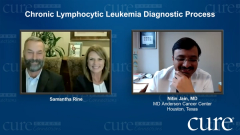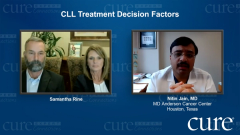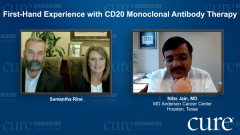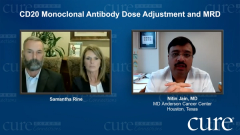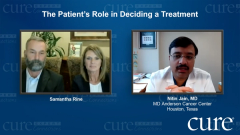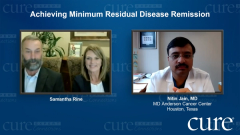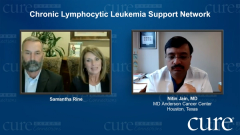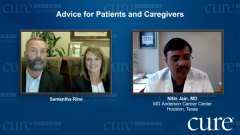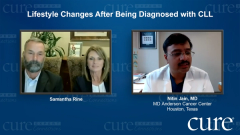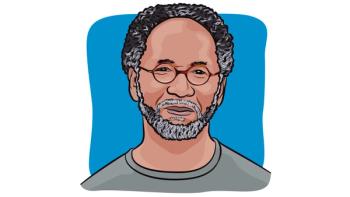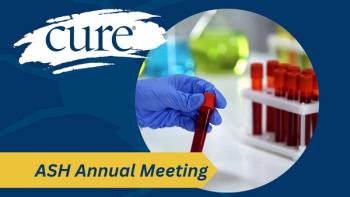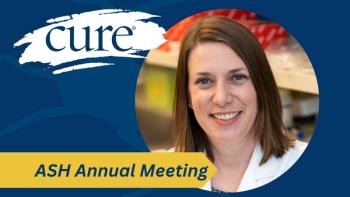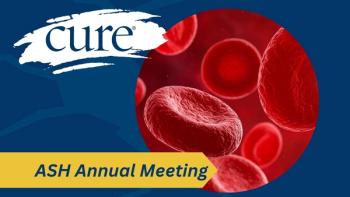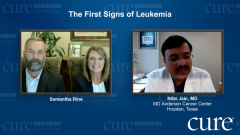
Chronic Lymphocytic Leukemia Support Network
Episodes in this series

Nitin Jain, MD: How often were you communicating with the team? Were there other support networks you were looking at close to home? Did you use online resources? What was going on besides your interactions with me as a physician? What other team members were you reaching out to for questions outside of MD Anderson Cancer Center, be it online or elsewhere?
Samantha Rine:You mentioned your physician’s assistant, Victoria. She’s a great resource. I emailed her several times with questions, and she has provided great support. Because I was coming to the clinic so often for a year, I became familiar with the people that work there, such as the laboratory technicians, the nurses, and the administrative team. However, one of the things that really stood out to me in addition to becoming friendly with the staff, was that every time I walked inside I was called by name despite MD Anderson being an institution that actively treats hundreds of thousands of people.
That is huge for someone who is going through a treatment. For those of you who don’t know MD Anderson, it’s an enormous campus with thousands of people who walk through their doors every day. It’s a scary thing to be a number. I know a lot of people going through similar treatments, and they’re known only by their medical record number. I will tell you Dr. Jain, I never even memorized my medical record number. From the beginning, I said I was not going to be a number; I’m going to be a person. I was never treated like a number. Every time I walked in the door, I was called by name, and that is a huge comfort for someone who is facing a scary thing.
Outside of the hospital and your clinic, we had a good support system here in town. We had great support from our family, and our church was very integral in supporting us. My advice to anybody who receives a sudden diagnosis is to lean on those people, you’re not bothering them. Your friends and your family want to support you, and I was able to lean on mine.
I am the kind of person who didn’t want to hear any bad news. When I received a diagnosis, I made my mind up at the beginning that whatever my team and my doctors said, I was going to follow. I wasn’t going to do any research on the internet, and I wasn’t going to let the internet tell me that I was going to die tomorrow. In my case, ignorance is bliss.
Doug Rine: I needed to know what we were dealing with, so for me the information was important. As Samantha mentioned, whenever we had a question, whenever we needed time to discuss something with somebody, you were available, Victoria was available, and everybody on your staff was available. They took the time to not only give us the answer but to also discuss it with us. I wanted the information. I learned about blood work, lab tests, and things that were foreign to me, but I needed to know those things. That helped me to understand the information you were giving us.
Samantha is a very positive person. Negative is not good, so we kept everything positive. There was never a doubt that the treatment wouldn’t work. There was never a doubt that she wasn’t going to be MRD [minimal residual disease]-negative. It was just positive reinforcement to each other that she’s not the only one going through it, we’re going through it together. By utilizing your staff and support group from MD Anderson, and through our church and family, we kept it positive.
Nitin Jain, MD: For the broader audience of patients with CLL [chronic lymphocytic leukemia], there are also resources that are available. Within the Leukemia & Lymphoma Society, they have webinars with CLL doctors explaining information. There are other professional societies involved in spreading education, including Patient Power and the CLL Society. Those are good resources for patients as they have information on CLL and some of the other topics we have discussed.
There are patients who may need financial help with accessing these drugs because they are expensive. Often, there are copays involved, which many patients may have financial difficulty with. There are financial resources available from societies and pharmaceutical companies, which you should ask your doctors, their respective teams, and the pharmacy team for information on. Often, particularly in our center, my team in the clinic is able to get financial resources for patients who are not able to afford those medications. Certainly, there are many resources out there, and I believe if you’re diagnosed with CLL, you should look at them and take advantage.
Transcript Edited for Clarity

